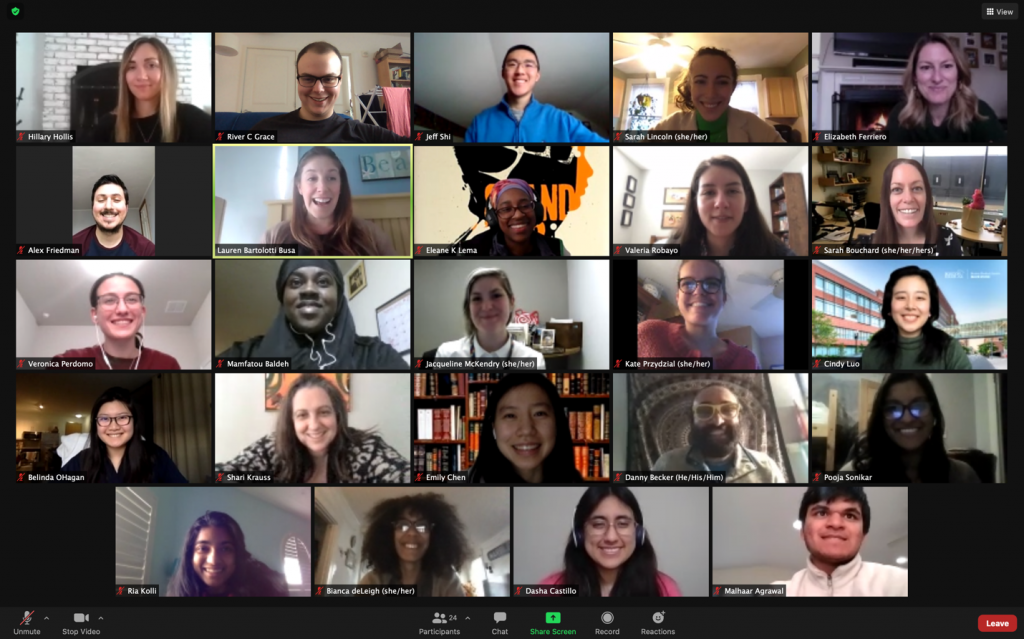IAP Health: River Grace (’21)
“Huh,” I thought. “I guess this might be cool.” Even though it was already October, I hadn’t at all thought ahead to how I wanted to spend my IAP 2021. That is, until a message popped up in my inbox with the title: [Boston Medical Center wants YOU!] Health Equity at BMC w/ PKG. I had always been passionate about medicine and community service, so the tagline of “Health Equity”, combined with the chance to work at a prominent medical center like BMC, seemed pretty exciting. The problem was, just like with everything else in the world right now, the entire internship would be virtual. “Ugh,” I remember saying to myself. Would it really be that great to spend my IAP working at Boston Medical Center if in reality I was just sitting on my couch at home? (Spoiler alert: it would.) I decided to go for it and I applied on a whim, completely unaware of how that whim would forever shape the way I view the field of medicine.
January appeared before I knew it and I was suddenly thrown into the incredible world of the BMC Autism Program. The program staff were amazing from day one; even though they were just a handful of faces on my MacBook screen, I couldn’t help but be impressed by their warmth and expertise. The other MIT students in my cohort were just as impressive – even though none of us were autism experts, they were all clearly brilliant, driven, and caring group members. My own subgroup, the Research Team, quickly became especially close to my heart. The six of us – my teammates Emily, Dasha, and Malhaar, plus our supervisors Belinda and Pooja – soon formed a collaborative bond that I never expected could have developed so easily without any of us in the same room. We made significant research progress with ease, and had many laughs and enjoyable Zoom calls while doing so.
But much to my surprise, the aspect of IAP that I found most formative was my ability to learn from the Autism Program’s patients. Especially surprising was that I did so without even interacting with a single patient in person. So how was this possible? In a word: transcripts. My research project was based around reading and analyzing transcripts of interviews with children and their parents involved in a program called Teens Engaged As Mentors (TEAM). The program, started in 2015, pairs children with Autism Spectrum Disorder (ASD) with older teen mentors and provides them with all kinds of fun activities, from visits to the aquarium to hands-on community service to skill-building workshops. And after 5 years of fun, socialization, and growth, it became my task to read and interpret everything that the mentors, mentees, and their parents had shared about their experiences in the program.
I read about the boundless fun that participants had, from making deep friendships to engaging in new experiences. I also witnessed their challenges, struggling to contain their emotions or sometimes being too nervous to socialize. I got to see relationships form and break up, witness mentees become mentors, and watch as children learned to share their voices. I saw how young mentees energetically expressed themselves and how their older mentors grew to empathize with and understand them, all while their parents reflected on the lifelong emotional growth and maturation of their children. I viewed five years of the everyday lives – the struggles and the normalcy – of families with ASD. My browser window, open for weeks to page after page of transcripts, became something more metaphorical: a window into the lives of families managing autism.
The year 2020, and so far the year 2021, have been incredibly challenging for everyone. With people stuck in their homes and everything going virtual, it’s easy to want to give up and not bother with new experiences, just as I initially felt when I saw that email back in October. But if I hadn’t bothered to apply for PKG IAP, I would never have had the story I’m able to share with you today. I wouldn’t have met the incredible staff or made new friends through the Research Team, I wouldn’t have made a meaningful contribution to the Autism Program’s research, and I certainly wouldn’t have had my window into the lives of families with ASD, which has forever shaped my view of an entire patient population as I head to medical school next year. Even though it was virtual, PKG IAP truly changed my life as a young soon-to-be doctor. I’m so glad that I didn’t give up on trying this new opportunity, and I hope you won’t give up either.

Tags: Autism, Health, Health & Medicine, IAP Health, IAP Health 2021
